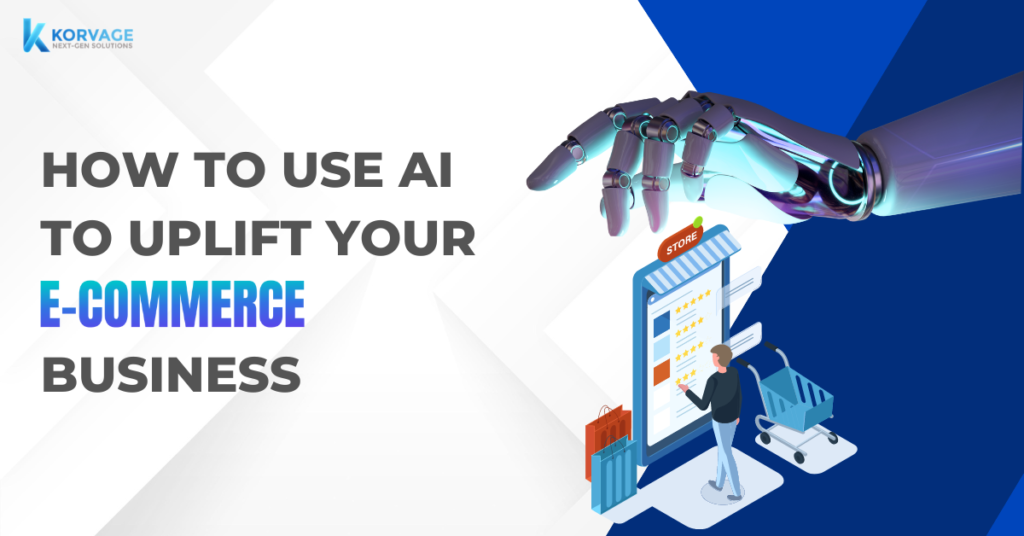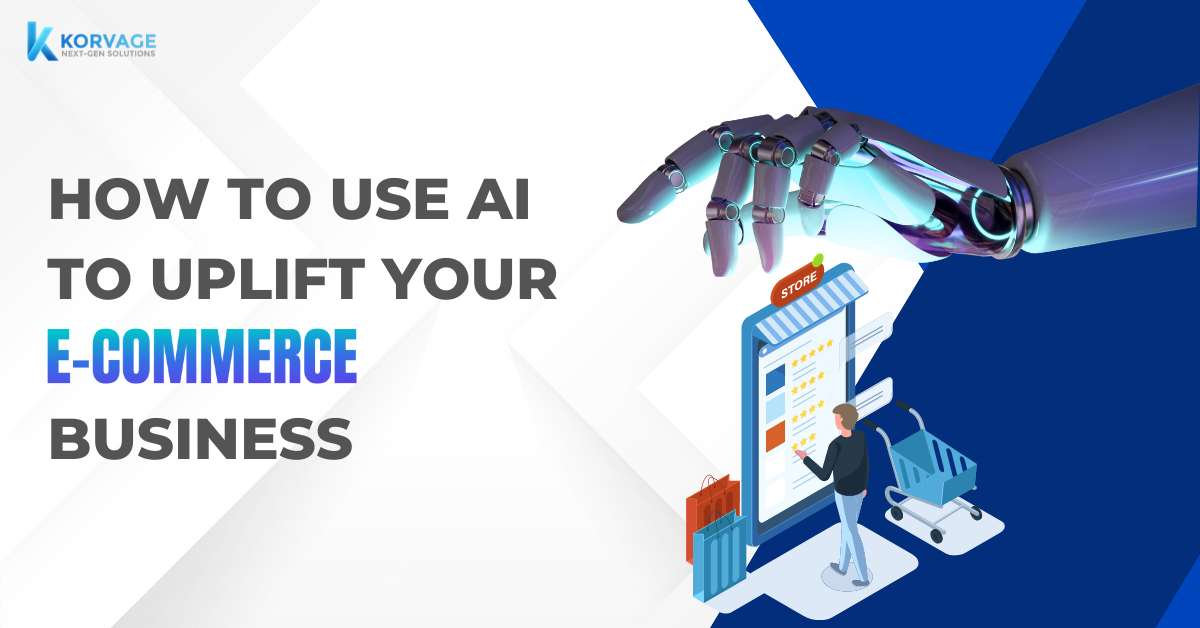How to Use AI to Uplift Your E-commerce Business?

Introduction
Artificial intelligence (AI) hybrids have emerged as a transformative force, changing the way businesses operate and interact with customers. This article goes into detail about the important role AI plays in e-commerce, providing an overview of its importance and how it can enhance businesses in the digital arena.
Understanding AI in E-commerce
Definition of AI
At its core, AI refers to the use of machines to simulate human mental processes, enabling them to analyze data, recognize patterns, and make appropriate decisions on their own in the case of e-commerce, AI is a set of technologies that enable businesses to improve business and customer experiences through artificial intelligence and data-driven insights
Role of AI in Transforming E-commerce
AI acts as a catalyst for change in e-commerce, riding innovation and performance in unique elements of the industry. Corporations can streamline strategies, create personalized connections, and release new avenues for increase in a competitive market
Typical AIs in e-commerce
E-trade organizations use numerous AI technologies to optimize operations and interact with customers greater effectively. Common AIs consist of gadgets gaining knowledge of, herbal language processing, PC imaginative and prescient, and predictive analytics, each imparting particular talents to deal with unique demanding situations and opportunities in e-trade.
Read the Latest Article: Why is Digital Asset Management Important for E-commerce?
Personalizing Customer Experience
Utilizing AI for Personalized Product Recommendations
AI algorithms analyze consumer facts and behavioral patterns to deliver personalized product recommendations, enhance the buying revel, and pressure conversions
Using Chatbots for Customer Support
Chatbots powered via AI allow businesses to offer a seamless and responsive guide to clients across the clock. These digital assistants use natural language processing to fast recognize and solve purchaser questions, improve satisfaction degrees, and reduce help fees
Predictive Analytics for Demand Forecasting
AI-driven predictive analytics analyze historical data and accurately predict future demand. E-commerce businesses can improve inventory quality, reduce inventory, and ensure timely fulfillment of customer orders.
Dynamic pricing methods with AI algorithms
AI algorithms enable businesses to implement dynamic pricing strategies that adjust prices in real time based on demand, competition, and other relevant factors Through dynamic pricing optimization, e-commerce platforms can increase revenues and maintain competitiveness in a dynamic market environment.
Automated Inventory Replenishment Systems
AI-driven inventory replenishment systems automate the process of restocking products based on demand forecasts and inventory levels.
Stitching marketing campaigns with AI insights
AI-driven analytics tools provide valuable insights into consumer behavior and preferences, enabling businesses to create precisely targeted marketing campaigns The use of AI insights enables eCommerce marketers to create targeted advertising build well, create real content, and maximize the impact of their marketing efforts.

List Management Optimization
Increases product search and discovery
Visually searched for power to use
AI-driven visual search technology allows consumers to search using images instead of text. By analyzing recognizable cues and similarities, e-commerce platforms can enhance product visibility and visibility, creating a more convenient and engaging shopping experience
To use an AI-powered search algorithm
AI-powered search algorithms use machine learning techniques to understand the user’s intent and deliver more relevant search results. Always learning from user interaction and feedback, these systems make search more accurate and relevant, helping customers find the results they’re looking for quickly and easily
Improves content classification and tagging
AI algorithms can analyze product features and consumer behavior to improve product classification and tagging. E-commerce platforms can streamline navigation and scheduling, making it easier for consumers to find products that meet their specific needs.

Streamlining Supply Chain Operations
Make logistics better with an AI roadmap
AI-powered route planning algorithms optimize logistics operations by identifying the most efficient delivery routes. By considering factors such as traffic, weather, and delivery restrictions, these systems reduce transportation costs and ensure timely delivery to customers
Standard Repair Machinery and Equipment
AI-powered predictive maintenance systems monitor machine and equipment status in real-time and anticipate potential failures before they occur. E-commerce businesses can reduce downtime, lower maintenance costs, and improve operational efficiency
By Enhancing Supplier Management with AI Intelligence
AI analytics tools provide insights into supplier performance and risk, enabling businesses to make informed decisions about supplier selection and management. E-commerce platforms can identify opportunities for collaboration, negotiate quality terms, and reduce supply chains
Fraud prevention and security enhancement
Negotiating fraud using AI algorithms
AI-powered fraud detection systems analyze customer data and user behavior to identify and block fraudulent activity in real-time Using advanced machine learning algorithms, e-commerce platforms can identify patterns and anomalies which is uncertain, and reduce economic loss and reputational damage.
Using biometric authentication for secure payments
Biometric authentication technologies, such as fingerprint or facial recognition, enhance security by verifying users’ identity during payments. E-commerce systems can strengthen security measures and protect sensitive customer information from unauthorized access
AI-powered tools for improving the development of cybersecurity programs
AI-powered network tools monitor networks and actively search for potential threats, such as malware and phishing attacks. Through AI-powered threat detection and response capabilities, e-commerce businesses can strengthen their defenses against cyber threats, protecting data integrity and customer privacy
Consumer Behavior Survey
Tracking and analyzing customer journey data
AI analytics platforms monitor and analyze customer interactions across multiple touchpoints, providing insights across the entire customer journey. E-commerce businesses can identify optimization opportunities and create personalized experiences to drive conversions and loyalty.
AI Analytics to show patterns and trends
AI-powered analytics tools analyze large amounts of data to uncover patterns, trends, and relationships that may not be apparent with traditional analytics methods Actionable insights revealed from complex datasets enable eCommerce platforms to make decisions knowledgeable, develop best practices, and stay ahead of the market trends
Using sentiment analysis for customer feedback
Sentiment analytics systems analyze textual data, such as customer reviews and social media comments, to measure sentiment and gain insight. Proactively address concerns, and increase customer satisfaction and loyalty.
Improved product recommendations
Link to filter individual recommendations
Collaborative filtering algorithms analyze user behavior and preferences to create personalized product recommendations. These algorithms recommend products that may appeal to individual consumers, increasing the likelihood of switching and repeat purchases
Includes suggestions for using AI algorithms to create products
The AI algorithm analyzes purchasing history and product associations and suggests complementary products to support customer purchases. E-commerce platforms can increase the value of orders and generate cross-selling opportunities, and ultimately revenues and customer satisfaction have increased
Provided recommendation engine to be used for cross-selling and upselling
AI-powered recommendation engines analyze customer data and browsing behavior to identify new trends with customer interests and preferences. E-commerce businesses can promote cross-selling opportunities and increase sales, driving revenue and value across the customer lifecycle.
Conclusion
Integrated AI has proven to be a game-changer for e-commerce businesses, providing unprecedented opportunities to improve efficiencies, connect customers, and develop strategic use of advanced AI technologies and responsible e-commerce platforms a new level of efficiency, innovation, and competitiveness in the digital age Unlock As AI continues to evolve and reshape the e-commerce landscape, companies must embrace the transformative power of AI to succeed in an increasingly complex and dynamic market.




